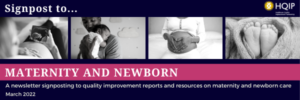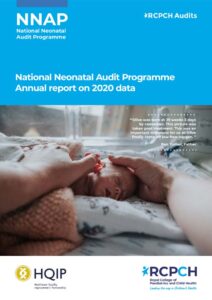Maternity and newborn newsletter
Published: 22 Mar 2022
“The data used to measure health outcomes in the 1,001 critical days is not capturing the whole picture. Improving the quality and timeliness of current data collections is the quickest way to improve outcomes.”
The Best Start for Life, Department of Health and Social Care
Welcome to a new themed update from HQIP. In light of the release of a new audit report on neonatal services from NNAP and the up-and-coming Ockenden Review (and to commemorate UK Mothers’ Day and International Women’s Day), we have decided to focus on maternal and newborn care in this first edition. In addition to the latest reports from relevant audits, this update brings together key information from both HQIP and the sector – and so is a useful summary for anyone working in this field.
| Please share: Help to update your colleagues by forwarding to anyone working in this field (if you receive this update and you are not on HQIP’s mailing list, you can subscribe to future updates here). You can also stay up-to-date by following us on twitter: @HQIP. |
Contents
- NEW from HQIP: NNAP 2022 annual report; PICANet annual report 2021; The ‘So What’ of Maternity Data project; Coming in 2022
- Look again: Recent reports; Spotlight on the Early Years report; Benchmarking
- Engaging patients: National Maternity and Perinatal Audit; National Neonatal Audit Programme
- Tender news: Maternal, Newborn and Infant Clinical Outcome Review Programme
- Sector round-up: Reports; Updates; Resources and updates
- Long read (blog): Collecting the data is just the start
- And finally: News and resources relating to quality improvement generally
NEW from HQIP

NEW National Neonatal Audit Programme (NNAP) Annual Report, March 2022
This latest report from NNAP, which is based on 2020 audit data from neonatal services in England and Wales, found that 6.3% of babies born at less than 32 weeks’ gestation and admitted to neonatal care died before discharge or 44 weeks. This represents a reduction of 0.3% since 2017-2019 (6.6%). There was also an increase in the number of mothers of babies born at less than 30 weeks’ gestation being given antenatal magnesium sulphate (85.7% compared with 82.1% in 2019). However, this report also identifies a number of areas for improvement, including:
READ IN FULL: The full report, with all key findings and recommendations, can be found here. |
PICANet Annual Report
In January, the Paediatric Intensive Care Audit Network (PICANet) published its annual report for 2021, complete with supplementary chapters relating to the COVID-19 pandemic. Covering paediatric critical care in the UK and Republic of Ireland (ROI) from 2018 to 2020, it found that the number of admissions reduced from just over 20,000 per year from 2018–19 to 16,400 in 2020 (due to the COVID-19 pandemic). However, the likelihood of dying whilst being treated within PICUs remained very low with 96.4% of admissions discharged alive in 2020.
READ IN FULL: Use these links to see the Annual Report and its Supplementary Chapters on COVID-19 online.
The ‘So What’ of Maternity Data
Maternity services are inundated with data and reports, but the understanding of what happens next is more limited. Josie O’Heney, an obstetric trainee and National Medical Director’s clinical fellow at HQIP, is undertaking a project to explore the role of national data and reports at trust level – looking at what is useful, how the data is used and its role in quality improvement. If you work in maternity services and have any involvement in audit and/or quality improvement then we would like to hear from you – this survey will take less than 10 minutes to complete.
Coming in 2022
HQIP is responsible for several national healthcare quality improvement programmes, including the National Clinical Audit and Patient Outcomes Programme (NCAPOP) on behalf of NHS England. As such, we manage the publication of reports from over 60 audits and programmes. Find below a summary of the reports related to maternity and newborn care that are due to be available in 2022 (projected publication date in italics*):
- National Maternity and Perinatal Audit (NMPA) Annual Clinical Audit Report, 12 May
- National Child Mortality Database (NCMD): The Contribution of Perinatal Events to All-Cause Child Mortality, 9 June
- National Child Mortality Database (NCMD): Sudden and Unexplained Deaths in Infancy and Childhood (focus on Risk Factors and Social Deprivation), 11 August
- Maternal, Newborn and Infant (MNI) Clinical Outcome Review Programme: MBRRACE-UK Perinatal Surveillance Report, 13 October
- Maternal, Newborn and Infant (MNI) Clinical Outcome Review Programme: MBRRACE-UK Maternal Report, 10 November
STAY UP-TO-DATE: For notifications when these reports become available, sign up to HQIP’s mailing list to receive our monthly eBulletins.
*These dates are indicative and subject to change – a full up-to-date publication schedule from HQIP can be found here.
Look again
Recent reports
HQIP has an unparalleled repository of reports and other resources to support quality improvement and clinical effectiveness in healthcare services. Find below a summary of those relating to maternity and newborn care from last year:
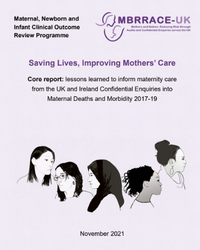 |
Maternal, Newborn and Infant (MNI) Clinical Outcome Review Programme MBRRACE-UK Saving Lives, Improving Mothers Care report and infographic (Nov 2021): Reviews surveillance data on women who died during or up to one year after pregnancy, between 2017 and 2019 in the UK. |
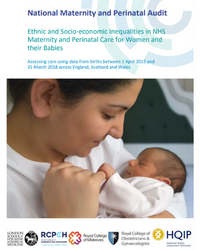 |
National Maternity and Perinatal Audit (NMPA) Inequalities Sprint Report (Nov 2021): Investigates ethnic and socio-economic inequalities in maternity and perinatal care for women and babies. |
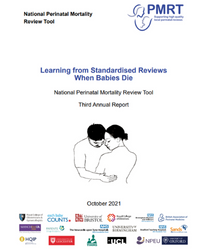 |
Perinatal Mortality Review Tool (PMRT) Third Annual Report and infographic (Oct 2021): Based on reviews carried out from March 2020 to February 2021. |
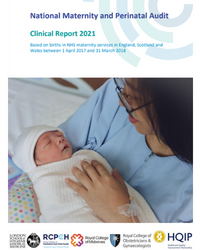 |
National Maternity and Perinatal Audit (NMPA) Clinical Report 2021 (Oct 2021): Presents measures of maternity and neonatal care based on 304,518 births between 1 April 2017 and 31 March 2018 in NHS services. |
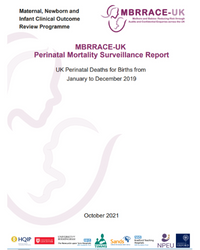 |
Maternal, Newborn, and Infant (MNI) Clinical Outcome Review Programme MBRRACE-UK Perinatal Mortality Surveillance Report 2021 (Oct 2021): Focuses on the surveillance of perinatal deaths from 22+0 weeks between 1 January 2019 and 31 December 2019. |
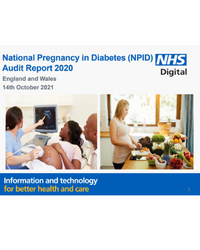 |
National Pregnancy in Diabetes (NPID) Audit Report (Oct 2021): Based on 4,525 pregnant women with diabetes in 2020. |
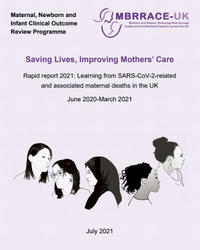 |
Maternal, Newborn and Infant (MNI) Clinical Outcome Review Programme MBRRACE-UK rapid report, 2021: Learning from SARS-CoV-2 related and associated maternal deaths in the UK (July 2021): Lessons identified from the care of women who died between 1 June 2020 and 31 March 2021 (from SARS-CoV-2 infection or wider issues relating to the pandemic). |
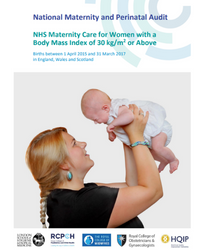 |
National Maternity and Perinatal Audit (NMPA): NHS Maternity care for women with a Body Mass Index (BMI) of 30 or above (May 2021): This report is accompanied by a lay summary to support the sharing of key findings with patients and a wider group of stakeholders. |
FURTHER RESOURCES: More reports, infographics and resources to support quality improvement on a wide range of clinical disciplines can be found on the Resources section of our website.
Spotlight on the Early Years
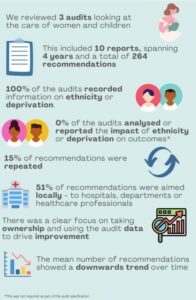
This report from HQIP (out Oct 2021) aims to identify cross-cutting lessons relating to early years healthcare, with a focus on health inequalities and variation in care. Over 250 recommendations from ten reports were reviewed and, in turn, a number of over-arching recommendations were made, including:-
- Health equality needs to be specifically addressed in NCAPOP programmes by, for example, setting a requirement for a minimum dataset of patient characteristics, and
- Audit measures should be standardised to enable reporting on universal characteristics such as ethnicity and deprivation, improving the scope for programme-level learning.
However, the report also calls for changes to audit reporting such as to moving towards shorter reports, with timely interactive datasets and links to online improvement resources.
READ IN FULL: Spotlight on the Early Years can be read in full here.
Benchmarking
National Clinical Audit Benchmarking (NCAB) is an online portal providing access to national audit performance data benchmarked by speciality, Trust, hospital or unit. Availability depends on each audit or registry’s publishing schedule; find below details of recently published data relating to maternity and newborn-related services:
- Maternal, Newborn and Infant Clinical Outcome Review Programme – published January 2022
- Paediatric Intensive Care Audit – published September 2021
FIND OUT MORE: To find out about your provider’s benchmarked performance in a range of clinical areas – from maternity and paediatrics through to cancer and diabetes – go to the NCAB website.
Engaging with patients
At HQIP we are proud to say that involving patients and carers is at the heart of everything we do. Part of this endeavour is the Richard Driscoll Memorial Award, which celebrates best practice in meaningful public and patient involvement within national clinical audit. Find below a summary of two case studies relating to maternity and newborn care from recent years:
National Maternity and Perinatal Audit (NMPA)
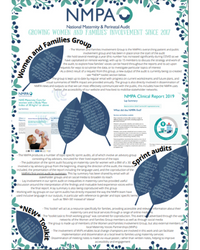
In 2021, we asked commissioned programmes to describe how patients and carers influence the production of patient-focused outputs. The NMPA entry demonstrated extensive work to involve a variety of patients in their audit, and this was outlined as an exemplar in a resultant case study.
CASE STUDY: You can view or download the one-page NMPA 2021 case study from the HQIP website.
In 2020, NMPA responded to a call to describe how they adapted to the challenges of the COVID-19 pandemic to sustain patient and public involvement in clinical audit. Their entry highlighted increased engagement through lockdown, engaging with marginalised groups by using new models with greater service user ownership.
CASE STUDY: You can view or download the one-page NMPA 2020 case study from the HQIP website.
National Neonatal Audit Programme, 2020
The NNAP team works very closely with their parent representatives and this blog highlights the benefits of working practices during lockdown and how it improved accessibility for interested parents to be involved with examples of outputs and impact throughout the pandemic.
BLOG: You can find out more about NNAP work to engage patients on the HQIP website.
Tender news

HQIP NCA 2141 – Maternal, Newborn and Infant Clinical Outcome Review Programme
Applications closing date: 30 March 2022, 12:00
We are seeking to commission an organisation that will support the delivery of the Maternal, Newborn and Infant Clinical Outcome Review Programme.
MORE INFORMATION: Can be found on the Tenders section of our website up to the closing date.
Sector round-up
Find below a short overview of some of the key reports, resources on maternity and newborn services from the wider healthcare sector. We recognise that many have been published for some time and are well-known (and well used), but they have been included here nonetheless as they remain useful to anyone working in this field.
Reports
Independent Maternity Review (Ockenden Review)At the time of going to ‘print’, the Independent Maternity Review had been delayed but expected imminently. The new report will build on the initial findings published in December 2020, to which a National Response was released by NHS England and NHS Improvement in the interim. For an update on the second review, go to the Ockenden Review website. |
The best start for life; a vision for the 1001 critical days: Published in March 2021 by the Department for Health & Social Care (DHSC), this key report sets out how a “strong, supportive policy framework” can make a critical difference in the first 1001 days of a child’s life, and go on to have long-lasting positive impact thereafter.
Other useful reports include:
- Safer Maternity Care Progress Report 2021: Update from the NHS and DHSC on overall progress in meeting the National Maternity Safety Ambition.
- Safety, equity and engagement in maternity services: Draws on findings by the Care Quality Commission (CQC).
- Ethnic Inequalities in Healthcare: Released in February 2022, this rapid review from the NHS Race and Health Observatory includes a section on Ethnic Inequalities in Maternal and Neonatal Healthcare.
- CQC Maternity survey 2021: Looks at the experiences of women who had a live birth in early 2021.
Resources and updates
New taskforce to level-up maternity care and tackle disparitiesIn February 2022, the government announced a new Maternity Disparities Taskforce, to explore inequalities in maternity care and identify how the government can improve outcomes for women from ethnic minority communities. More information can be found here. |
Other resources and updates include:
- Core20PLUS5: Launched in November 2021, this is a national NHS England and NHS Improvement approach to support the reduction of health inequalities, which includes maternity as one of its five clinical areas of focus.
- National Maternity and Perinatal Audit (NMPA) webinar on inequalities in maternity outcomes.
- National Maternity Voices (NMV): A NHS working group comprised of women and their families, and commissioners and providers working together to review and contribute to the development of local maternity care.
- Family Integrated Care (FICare): Supports the full integration of families in the care of their infants in the NICU (newborn intensive care unit).
- Equity and equality: NHS guidance for local maternity systems.
See also the following reports and resources from previous years: The Maternity and Neonatal services section of the NHS’s Long Term Plan; NHS Better Births and the Maternity Transformation Programme; and Lockdown Babies and Best Beginnings in the Early Years by the former Children’s Commissioner.
Long read (blog)
Collecting the data is just the start, Dr Josie O’Heney

Dr Josie O’Heney is an Obstetrics and Gynaecology trainee, and is currently a National Medical Director’s Clinical Fellow at HQIP. In this blog for BMJ Leader, written as part of a series of blogs to explore the ‘5’ focus areas from Core20PLUS5, she considers the role of effective clinical leadership in nurturing and supporting midwives to build safer and equitable maternity services.
“One day we won’t be reporting that the colour of your skin impacts your risk of dying at what should be one of the happiest times of your life”
“As an obstetrician I have read the maternal mortality Confidential Enquiries since early in my career, but didn’t attend my first MBRRACE-UK launch event until 2019. Health inequalities data had been collected and reported on in the past, but my lasting memory from the day was the shocking racial disparities in outcomes for birthing people in the UK, with black women being five times more likely to die than white women…
Read this blog in full here.
And finally
While we have your attention, we thought you might like to know about the following projects and resources that are not necessarily related to maternity and newborn services but are of interest to anyone working in quality improvement.
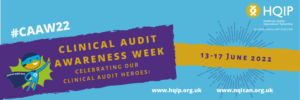
Clinical Audit Awareness Week #CAAW22
13-17 June 2022
Clinical Audit Awareness Week (CAAW) is a national campaign to promote and celebrate the benefits and impact of clinical audit and quality improvement work in healthcare. It includes the Clinical Audit Heroes Awards, which are an opportunity to recognise and learn from the work taking place across the community. Find out more here.
Other projects and resources include:
- HQIP’s eLearning area with free-to-use education packages related to clinical audit and healthcare quality improvement
- Resources for trainee doctors: A set of tools and information to help trainee clinicians with navigating quality improvement
- Assorted guidance for professionals in the field
|
Tell us what you think? We are always interested to receive your feedback and, as this is a new style of newsletter, we are particularly keen to hear from you. Please send any comments to [email protected]. |


